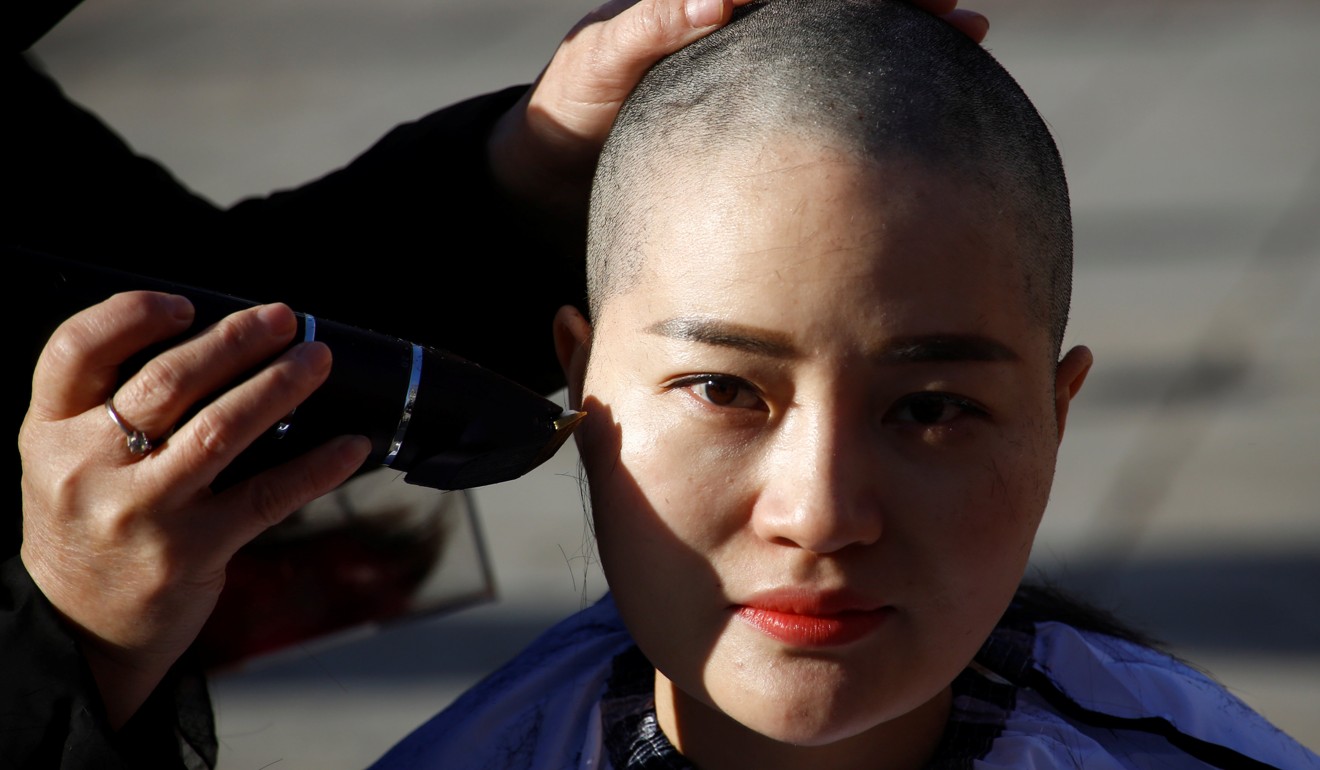
Chinese human rights lawyer Wang Quanzhang jailed in 2015 crackdown’s final case
- ‘Authorities are guilty, not Wang Quanzhang,’ says wife Li Wenzu as court in China’s north sentences the 42-year-old for subversion
- Wang had stood trial in December behind closed doors after more than three years behind bars, in a hearing condemned by lawyers and rights groups
Chinese human rights lawyer Wang Quanzhang, the last lawyer tried in the massive “709 crackdown” on rights activism in 2015, was sentenced to 4½ years in prison for subversion on Monday.
Tianjin No 2 Intermediate People’s Court said in a terse statement that Wang, 42, was also deprived of political rights for five years, in a verdict condemned by Wang’s wife Li Wenzu.
It was the final case resulting from the 2015 manhunt by Chinese authorities that targeted hundreds of rights lawyers and activists, which became known as the 709 crackdown in reference to the date – July 9 – on which it began. Wang was detained in August of that year.
Critics said the crackdown was designed to restrict China’s emerging rights defence movement. Most of the detainees were later released, but several reported being tortured while in detention.
Li, who has been campaigning for Wang’s release and was barred from attending his trial behind closed doors last month, said after the verdict that her husband was innocent.
“The authorities are the guilty party, not Wang Quanzhang,” Li said in a text message.
In a statement posted on Twitter, Li also said she supported Wang’s choices.
“I will continue to defend Wang Quanzhang’s rights, I will bring up our child well, [and] wait for Wang Quanzhang to come home,” she wrote.
After more than three years behind bars, Wang stood trial in the northern port city of Tianjin in December, in a hearing held behind closed doors, with the court saying “state security” was involved.
The hearing was condemned by other lawyers and rights groups for breaching Chinese law.
Wang had begun offering legal advice to practitioners of Falun Gong, a spiritual group outlawed by Beijing, as well as to farmers fighting forced evictions while he was still a student at Shandong University in the late 1990s.
His case has come to international attention and German Chancellor Angela Merkel visited Wang’s wife Li during a trip to China in May.
Xie Yanyi, a fellow rights lawyer, said the time taken to investigate Wang since 2015 and prepare for his trial had underlined the difficulties faced by the authorities in building evidence against him.
“Wang has never developed any theory of political transformation; he was only acting tough when dealing with his human rights cases,” Xie said.
Among all the rights lawyers and activists rounded up, Wang was among the least willing to cooperate with the authorities in a trial. At the start of his trial on December 26, he fired the government-appointed lawyer assigned to him.
“Wang is doing his best to maximise the costs of the authorities,” Xie said. “I believe he will further appeal and drag more judges and prosecutors into the legal battle.”
Wang has 10 days to appeal against the decision to Tianjin’s high court.
Xie said that under Chinese law the time already served behind bars could be deducted from Wang’s sentence, along with half of the time spent under residential surveillance.
After his arrest in August 2015, Wang was initially placed under residential surveillance at a designated location for six months, allowing three months to be deducted, Xie said. Wang has since spent more than 2½ years in detention.

In a joint statement on Monday, the Hong Kong-based China Human Rights Lawyers Concern Group and dozens of civil rights bodies and pro-democracy parties in Hong Kong strongly condemned the Chinese court for violating Wang’s basic rights to legal representation and an open trial.
The groups demanded the immediate acquittal and release of Wang.
“The conviction and sentence on Wang did not go through a just legal procedure, and therefore are unjust,” the groups said in the statement.
They also expressed grave concern about Wang’s health, noting that he was reportedly forced to take medication for chronic illnesses during his detention, despite having no previous record of such illnesses.
Li formed a support group with other spouses of “709” detainees and campaigned for their release. Last April, she was barred from leaving China after her high-profile 100km (60-mile) march from Beijing to Tianjin, when she petitioned to visit her husband, whom she and their young son have not seen since his arrest.
In addition to being barred from attending Wang’s trial last month, Li was also prevented from petitioning the Supreme People’s Court over the treatment of her husband.
In November, Sweden awarded Li the Edelstam Prize for human rights, the first time it had been given to a Chinese person. Still barred from leaving China, she was unable to attend the award ceremony in Stockholm.
Caroline Edelstam, the founder and president of the Edelstam Foundation, said Li “has continued advocating, beyond her personal interest, for the principles of rule of law and democracy in China, and campaigned not only for her husband’s release but also for the freedom of all the victims of violations of human rights in China”.
Additional reporting by Guo Rui and Alvin Lum

